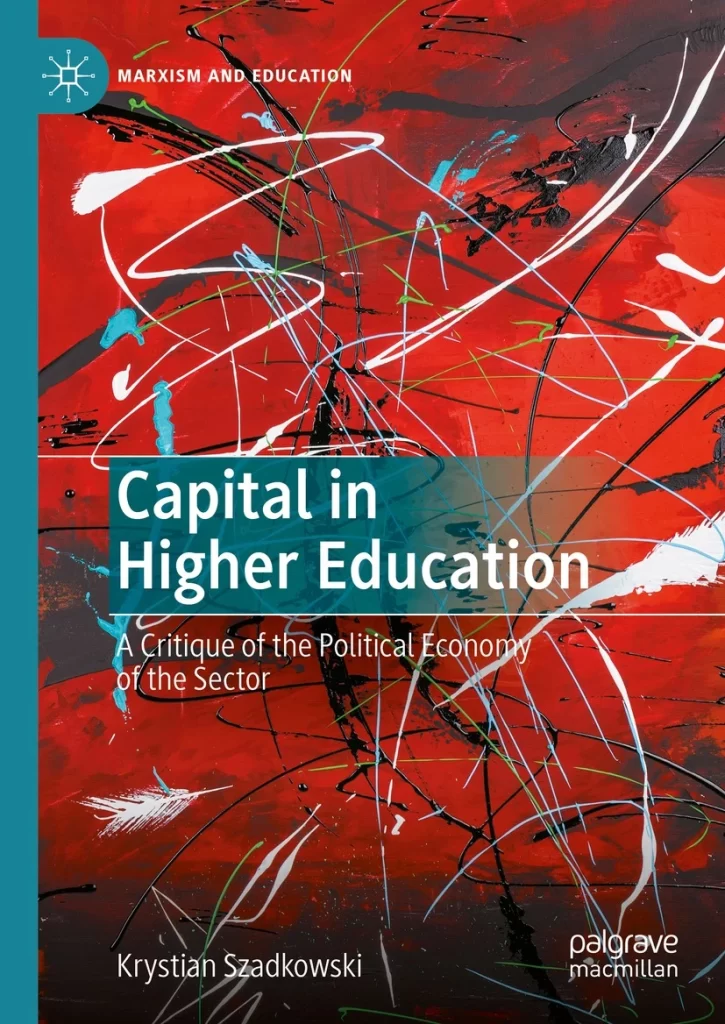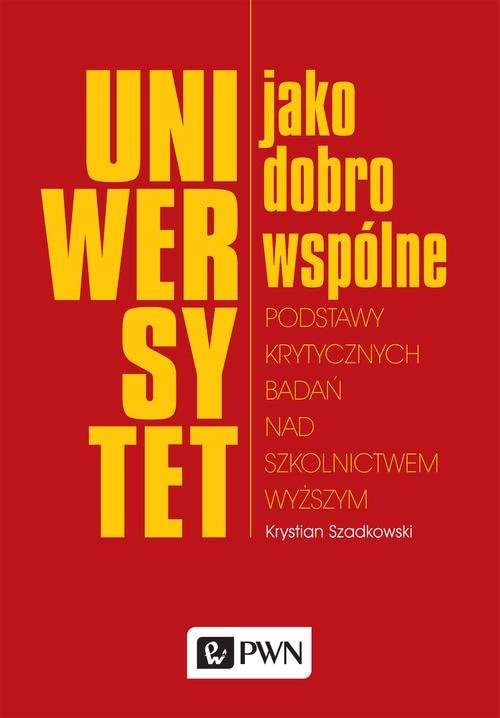- Szadkowski, K. (2023). Capital in Higher Education. A Critique of the Political Economy of the Sector. Basingstoke: Palgrave Macmillan.
This book offers a systematic, sectoral, and in-depth Marxist perspective on the critique of political economy of higher education. It proposes an original method of analysis of higher education as a field of capitalist production, grounded at the intersection of mainstream higher education research and contemporary debates in Marxist theories. At the same time, it imbues a political perspective based on the embedding of higher education within the wider social network of antagonistic relations that traverse the capitalist economy at large.
Endorsements
“A fascinating, innovative application of Marxian analysis to how labor in higher education is being subsumed by capitalism, not just within one country but internationally. Focusing on the work of research and publishing, especially interesting is Szadkowski’s analysis of capitalist efforts to measure in order to control academic labor-despite its complex heterogeneity. Beyond subsumption, his theory highlights the existence of commons in higher education, and struggles to liberate them from capitalism’s grasp.”
Harry Cleaver, author of Reading Capital Politically
“No other author in critical higher education studies applies robust Marxian analysis to produce a razor-sharp disquisition of the conditions of contemporary academic labour under capitalist capture, better than Szadkowski. Add to this an Engelsian lively language and attention to storytelling detail, and this otherwise heavy book makes a delightful read, albeit its insights leave little to take delight in when it comes to present-day universities.”
Mariya Ivancheva, author of The Alternative University: Lessons from Bolivarian Venezuela
“Szadkowski gives an answer to the crucial question: why restart from Marx in the analysis of the global university? This work builds up an autonomous method and a collective point of view, contra mainstream liberalism and orthodox Marxism. Thus, situated within and against the edu-factory, the author tells us that those who want to understand the contemporary university must be committed to its transformation.”
Gigi Roggero, author of The Production of Living Knowledge: The Crisis of the University and the Transformation of Labor in Europe and North America
“This book analyses how academic labour has been entangled in capital on a global scale. Using a deep understanding of Marx, it creates a fresh, clear and engaging understanding of the historical moments when the university’s multiple internal mechanisms of status, distribution of prestige, communication practices, and freedoms have been turned into a metricized, quantified, and competitive acceleration of academic labour. Breaking with existing Marxist and liberal analyses, the book’s outstanding scholarship provides an exciting and much-needed new understanding of the transformations of higher education.”
Susan Wright, Co-director of Centre for Higher Education Futures, Aarhus University, Denmark
Reviews
Zehra Taskin – Yükseköğretimin sermayesi, araştırma değerlendirme ve metriklere hapsedilmiş akademi üzerine… (The capital of higher education is about the academy confined to research evaluation and metrics). Here
Felipe Ziotti Narita – Contradições em movimento no ensino superior: ciência, trabalho e conhecimento no capitalismo globalizado (Contradictions in motion in higher education: science, labour and knowledge in globalised capitalism). Cadernos CIMEAC 13(2) 2023: 124-143. Here
And a response: Periferias, o comum e a finitude da subsunção capitalista no ensino superior: uma resposta a Narita (Peripheries, the common and the finitude of capitalist subsumption in higher education: a reply to Narita). Cadernos CIMEAC 13(2) 2023: 144-158. Here
Luis Andrade Martinez – A review in online journal Intervención y Coyuntura Here
- Szadkowski, K. (2015). Uniwersytet jako dobro wspólne. Podstawy krytycznych badań nad szkolnictwem wyższym. Warszawa: Wydawnictwo Naukowe PWN.
The university is undoubtedly at the centre of most societies in the world today. At the same time, however, it is today more than ever struggling to define its role and identity. For this reason, a thriving academic discipline today is higher education research, which seeks to set norms and values that are able to determine the function of academic institutions in contemporary societies. Their proposals, however, most often either reinforce and support the progressive marketisation of the university, or call for tighter public control without noticing the role of the state in subsuming higher education to neoliberal schemes, or finally express a longing for an academic ivory tower that never really existed.
The University as the Common sets out to create a different narrative of the university, one that escapes the dominant perspectives on higher education research today. Here, a vision for the future of academic institutions is linked to the work of social movements fighting against precarity, austerity and exploitation, and the university itself, understood as a the common, is situated in the context of social policies that support equality, welfare and democracy.
Reviews
“What to do in such a situation? It would be prudent to start by carefully reading the book University as the Common. Foundations for Critical Research on Higher Education and draw not only theoretical but also practical conclusions from this reading. Just as the intellectual tradition referred to by Szadkowski goes beyond the sterile dispute between market and state, proposing the regime of the common as not only the most just, but also the best, from a pragmatic point of view, method of organising our human world, so too the vision of the university as the common drawn in this book allows us to go beyond the ritual dispute of quasi-modernity with postfeudalism, in which the discussion on science and higher education in Poland is stuck. A different academy is possible! However, one needs to know how to fight for it. Szadkowski’s book provides us with many valuable tools in this regard. Whether we make good use of them, however, is now up to us.”
Jan Sowa, author of Fantomowe ciało króla. Zmagania z peryferyjną formą
“The University as the Common provides an extremely precise conceptual instrumentarium to reformulate the debate on the future of the university in such a way as to avoid reproducing the mechanisms that drive it into today’s crisis. At the same time, Szadkowski’s book shows that no laws will solve the problem. It is high time for the academic community to take matters into its own hands.”
Maciej Jakubowiak, Miesięcznik “Znak” 2016, “Czas na wspólnotę akademicką”
“The book as a whole is certainly a must-read for any reader wishing to get an idea of the extremely complex issues regarding the shape of the contemporary global university. We can also turn to its individual parts as good studies of certain specific problems. The perspective adopted by Szadkowski, according to which the dynamics of the development of the global system of knowledge production, the “global university”, can be explained as an antagonism between production based on the common and capital, which is a form of control over them, is an interesting counterproposal to liberal approaches to the problems of higher education.”
Eliasz Robakiewicz, Machina Myśli 2016


